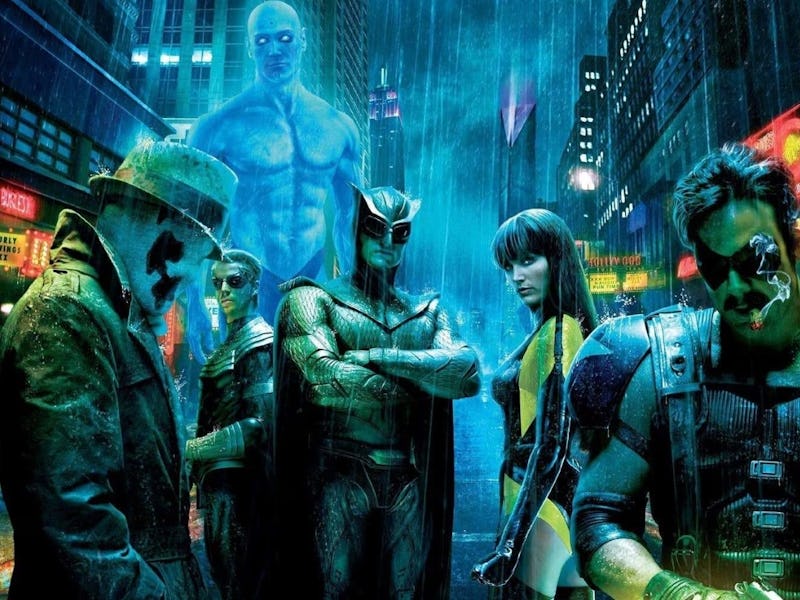Zack Snyder's Complicated Relationship With DC Began With Watchmen
To understand the Snyderverse, you have to revisit his most controversial comic book adaptation.

Zack Snyder’s Watchmen was a monumental moment in the history of comic book cinema. It adapted Alan Moore and Dave Gibbons’ seminal DC Comics miniseries, which had been dubbed “unfilmable” by Terry Gilliam. It gave R-rated superheroes a chance to shine on the big screen long before movies like Deadpool and Logan proved they have mass commercial appeal. And perhaps most notably, it also kicked off Snyder’s complicated relationship with the DC Universe.
As 2009’s Watchmen celebrates its 15th anniversary, Warner Bros. is in the process of rebooting the DCU under James Gunn, who recently began production on his new Superman movie. Gunn will be responsible for making audiences forget about the DCEU (aka the Snyderverse) that kicked off with 2013’s Man of Steel. But before Snyder dove into the larger DC sandbox to bring divisive versions of Superman and Batman to life, he brought unflinchingly faithful iterations of characters like Rorschach and Dr. Manhattan to the silver screen.
Snyder got the job directing Watchmen after 300 became a breakout hit. Other directors, like Darren Aronofsky and Gilliam, had tried — and failed — to make it happen. Snyder’s approach was simple: stay as close to the source material as possible. He even used pages from the graphic novel as storyboards. Save for his more believable ending (a nuclear attack replaces the comic’s giant squid), Snyder attempted to bring Moore and Gibbons’ much-beloved comic to life. Setting aside one’s feelings on the film, it’s fair to say he had quite a bit of success.
Watchmen was a landmark in comic books earning mainstream respectability, and it’s sacred to many fans of the medium, so the movie was always going to be fighting an uphill battle. In the end, Snyder’s glossy style, heavy use of slow-motion, and slavish devotion to the source material proved quite contentious. This theme would permeate the rest of Snyder’s work at DC, making Watchmen almost prophetic.
This adaptation of Moore’s work didn’t come cheap, costing the studio a whopping $120 million (a huge sum for an R-rated movie at the time). When Watchmen failed to meet its lofty commercial expectations, “expensive movie that underperformed” became another narrative that would follow Snyder around. But while Watchmen wasn’t the commercial triumph Warner Bros. had hoped for, it was still enough to land Snyder the coveted gig of rebooting the Superman franchise, which would kick off DC’s own cinematic universe and the brand’s frantic attempt to catch up with Marvel.
Fans debated whether Snyder captured Watchmen’s themes, but he certainly translated its bone-crunching brutality.
“It’s a two-and-a-half hour R-rated movie, and there’s no precedent for that type of film becoming a huge blockbuster,” Snyder said of his Watchmen adaptation in a 2009 Guardian interview. “What’s popular about The Dark Knight is that it’s a superhero movie at its core. When Batman puts on his costume, that’s badass…Watchmen is an entirely different experience: it punishes the audience…From an intellectual standpoint that’s fun to do, but it’s off-putting if you’re there to enjoy a movie that’s supposed to be a superhero movie.”
Looking back, that says much about how Snyder views superheroes in general. Snyder didn’t care about being off-putting, so it’s unlikely he cared how some fans would react when Superman brutally dispatches Zod at the end of Man of Steel. Similarly, in an interview with Entertainment Weekly, the filmmaker laid out some of his thoughts about characters like Superman long before he was officially tasked with reviving them for modern audiences.
“If Superman grabbed your arm and pulled really hard, he’d pull your arm out of your socket. That’s the thing you don’t see in a Superman movie. But in Watchmen, what you get is, like, ‘I’m a Superman, and I really want to help mankind — but I just tore this guy in half by accident. People call me a ‘superhero,’ but I don’t even know what that means. I just blew this guy to bits! That’s heroic?’”
These are not heroes.
This quote helps Man of Steel’s murder-heavy third act make much more sense. It also shines a bright light on Batman v Superman’s Batman, who absolutely does not care about his body count. Snyder’s DC Universe was colored by Watchmen’s assumption that a world populated by superheroes would be a dark, dystopian one.
While Snyder’s DCEU movies were far less faithful to their source material, they were very much a representation of him as a filmmaker. In that way, it shouldn’t have surprised Warner Bros. when things got dicey by the time they got to Justice League. Warner knew what they were getting with Snyder, and it wasn’t what Marvel had with Kevin Feige. They got the guy who knows Superman could carelessly pull your arm out of your socket. They got the guy who directed Watchmen.